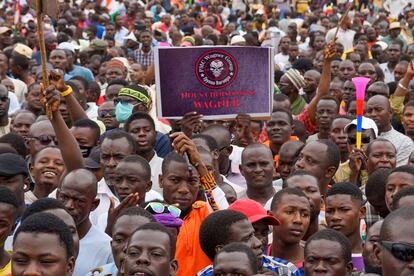Prigozhin’s death to put Wagner’s influence in Africa to the test
Drawn by natural resources, the mercenary corporation operates in Libya, the Central African Republic, Sudan, and Mali, where they strive to spread Russian influence and enrich the Kremlin

It is no coincidence that Yevgeny Prigozhin’s final video is dedicated to Africa. Nor that one of the last-known photographs of the Wagner Group’s leader was taken at the Russia-Africa summit held at the end of July. The African continent had in recent years become one of the mercenary organization’s main focuses of influence and income, a trend that seemed to be accentuated after the failed rebellion against Vladimir Putin in June. Lured by natural resources and million-dollar security contracts, and with the declared aim of extending Russian influence on the continent, thousands of Prigozhin’s mercenaries are now operating in countries including Sudan, Libya, the Central African Republic, and Mali.
After the death of its patron, Wagner’s future in Africa looks uncertain. But shared interests — on the one hand, the profits Russia benefits from; on the other, the security gained by the regimes that hire the mercenaries as a Praetorian Guard — make it likely that the corporation’s activities on the continent will continue to some extent.
“PMC Wagner is conducting a reconnaissance operation to make Russia greater on all continents and Africa freer,” Prigozhin said in the video released last Monday, in which he can be seen with an automatic weapon in his hands and in a desert landscape similar to the Sahel, with some of his men in the background. Although he does not specify his location, it could well be Mali, more specifically the town of Sévaré, where Wagner has one of his main bases of operations.
“Let’s make it a nightmare for ISIS, al-Qaeda and other thugs. We are hiring real bogatyrs [ancient Slavic warriors] and continue to fulfill the tasks that were set before us and that we promised we would handle,” Prigozhin continued, as quoted by CNN.
Wagner’s failed mutiny against the Kremlin raised the first doubts about the continuity of the mercenary company in Africa, but the Russian Foreign Minister, Sergey Lavrov, swiftly dispelled any uncertainty. “This will not affect relations between Moscow and its African friends [...] Wagner’s work in the Central African Republic and Mali will continue. [Wagner’s mercenaries] are doing a good job,” Lavrov told Russian media. Now it is Prigozhin’s death that is sowing doubts, although the extent and solidity of the networks created for Moscow’s benefit point to Wagner’s continued presence on the ground in Africa.
Gold and diamonds in exchange for security for President Faustin-Archange Touadéra: this was the formula with which companies from the Wagner sphere arrived in the Central African Republic (CAR) in 2017. By handing over vast sums of money and access to the country’s natural resources, Prigozhin managed to get the rebel groups to accept a peace agreement a year later. Since then, the CAR has become one of Wagner’s major centers of operations in Africa, from where they have launched a campaign of financing activists and social media propaganda to gain ground on the West. The more in the shadows, the better: in July 2018, three Russian journalists investigating Wagner’s activities in the CAR were killed under mysterious circumstances.
But this presence in the CAR is not an isolated event in Wagner’s expansion across Africa. The first reports of the presence of Russian mercenaries in Libya date back to 2018 and point to their involvement in the civil war, on the side of Field Marshal Khalifa Hafter, the head of the Libyan National Army. Eventually, the number of mercenaries exceeded 1,000. The third Wagner on the African continent is Sudan, where it has allegedly been involved in gold mining since 2017, when dictator Omar al-Bashir weaved his first ties with Prigozhin. Currently, Wagner is a staunch ally of General Mohamed Hamdan Dagalo, the leader of the Rapid Support Forces fighting the regular government army in the Sudanese civil war.
Cornered by defeats suffered against the jihadist Al-Shabab insurgency in the northern province of Cabo Delgado, in 2019 Mozambique enlisted Wagner’s services to ensure the security of strategic sites. However, after being ambushed and suffering severe losses, the company decided to withdraw from a country of dubious profitability. From 2020 onwards, most of Wagner’s propaganda and military efforts have been focused on the Sahel.
In August 2020, a group of colonels with close ties to Russia staged a coup d’état in Mali. Driven by strong popular support and a wave of anti-French sentiment, the military junta initiated a process of rapprochement with Moscow and a break with Paris that led in 2022 to the expulsion of the French forces who had been fighting jihadism in the country for almost a decade. To replace them, the coup leader Assimi Goïta recruited the services of Wagner, who deployed around 1,500 mercenaries in successive waves. Based mainly in the center and east of the country, they now fight alongside Mali’s regular army.
As in Syria or Ukraine, the brutal methods of Prigozhin’s mercenaries in Africa have been the subject of investigations by human rights organizations and EU and U.S. sanctions: summary executions of civilians and torture have been documented in Libya and the Central African Republic, but and most recent and damning example is the Moura massacre in Mali. Between March 27-31, 2022, Malian soldiers and suspected Russian mercenaries — “foreign military personnel speaking an unknown language” according to testimonies of local residents — executed 500 civilians and raped 58 women, according to a U.N. report. Mali has denied the findings, claiming that all those killed were members of jihadist groups.
As in Mali, the coups in Burkina Faso and Niger have been accompanied by demonstrations by citizens displaying Russian flags and pro-Wagner slogans. Despite the rapprochement with Moscow of Captain Ibrahim Traoré, the leader of the Burkinabe military junta, Wagner’s presence in the country has not been confirmed. In Niger, it is still too early to assess the role that the mercenary company might play in the fight against jihadism, but the rift between the military coup leaders and France is more than evident.
Sign up for our weekly newsletter to get more English-language news coverage from EL PAÍS USA Edition
Tu suscripción se está usando en otro dispositivo
¿Quieres añadir otro usuario a tu suscripción?
Si continúas leyendo en este dispositivo, no se podrá leer en el otro.
FlechaTu suscripción se está usando en otro dispositivo y solo puedes acceder a EL PAÍS desde un dispositivo a la vez.
Si quieres compartir tu cuenta, cambia tu suscripción a la modalidad Premium, así podrás añadir otro usuario. Cada uno accederá con su propia cuenta de email, lo que os permitirá personalizar vuestra experiencia en EL PAÍS.
¿Tienes una suscripción de empresa? Accede aquí para contratar más cuentas.
En el caso de no saber quién está usando tu cuenta, te recomendamos cambiar tu contraseña aquí.
Si decides continuar compartiendo tu cuenta, este mensaje se mostrará en tu dispositivo y en el de la otra persona que está usando tu cuenta de forma indefinida, afectando a tu experiencia de lectura. Puedes consultar aquí los términos y condiciones de la suscripción digital.









































